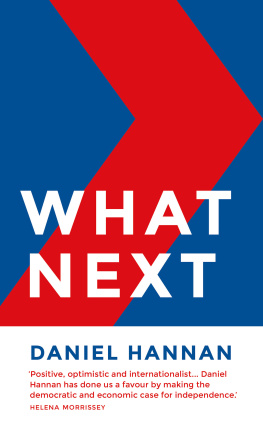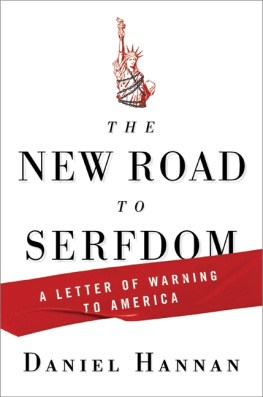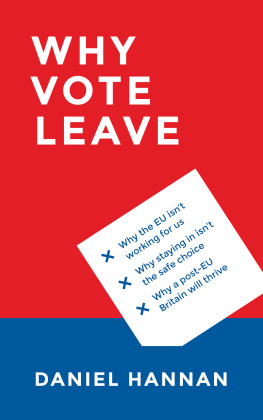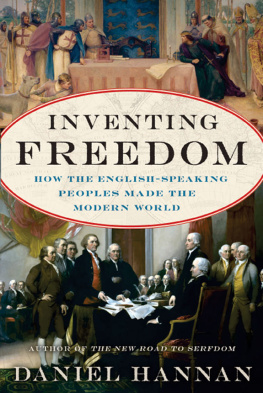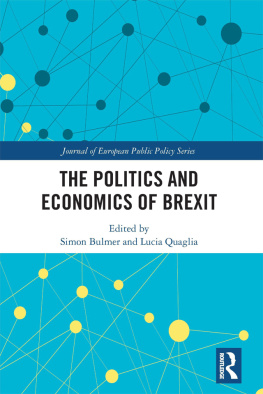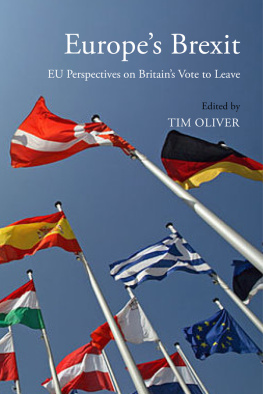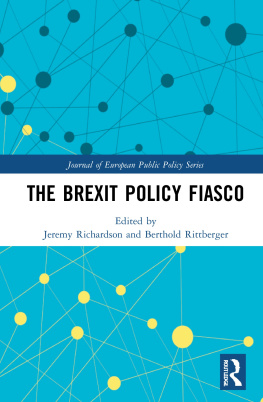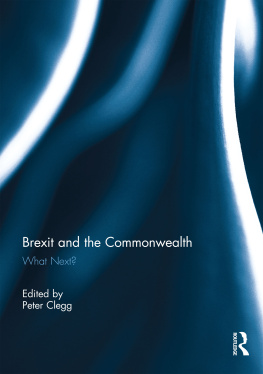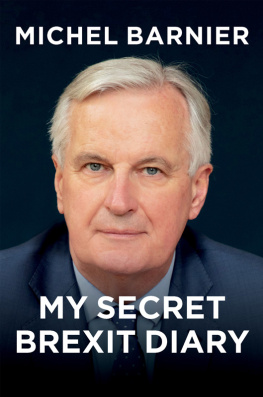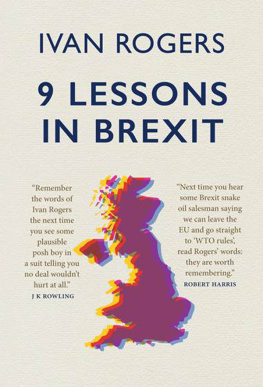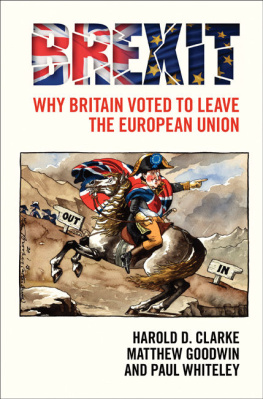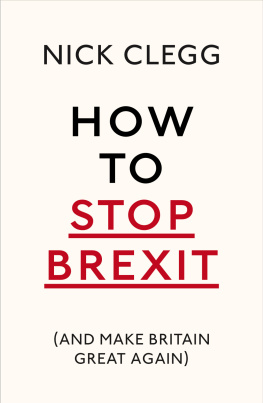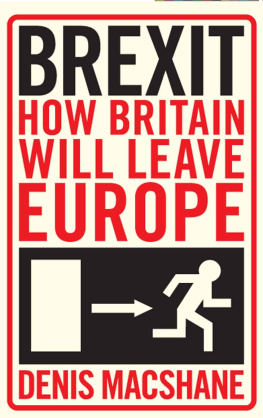WHAT NEXT
Daniel Hannan
www.headofzeus.com

On 23 June 2016, against all forecasts, Britain voted to leave the EU. Drawing on his experiences at the heart of the campaign, Daniel Hannan dissects the result and our reaction. He outlines why Vote Leave won, exploring what people were voting for and what they werent. He looks at the immediate aftermath how it differs from what people expected during the campaign and what it says about where to go next.
Brexit may mean Brexit, but Hannan asks what the options now are what a full-fat Brexit or a Brexit-lite may look like. He proposes the ideal architecture for a new relationship with the EU, and discusses how we can transition back to self-government.
He argues that there is no point in Brexit if we dont now tackle the threats to democracy of corporatism and lobbying, if having got powers back, we dont pass them down to local government, if we dont take the opportunity to put our Parliament properly in control.
A constructive antidote to Project Fear, Hannan shows that a successful Brexit will be mutually beneficial for Britain and for Europe.
To Alexander Frederick Maynard Hannan,
born one month after the referendum
Contents
W ILLIE WHITELAW , Margaret Thatchers genial deputy prime minister, was fond of saying that nothing in politics is ever as good or as bad as it at first looks. Its worth reminding ourselves of that little aphorism as the vote to quit the EU turns into hard policy.
It is already obvious that things arent as bad as was recently being claimed. During the campaign, we were repeatedly told that there would be a disastrous economic shock in the immediate aftermath of a Leave vote. The week after the referendum, a Reuters poll of City economists showed that 71 per cent were predicting a recession in 2016, a position shared by most of the main banks. Almost no one now expects that outcome, and J.P. Morgan, Goldman Sachs and the rest have quietly uprated their forecasts.
Equally, though, we shouldnt expect leaving the EU to effect an instant and benign transformation of Britain. As I argued throughout the referendum, the day after we leave will look very much like the day before. It will be the day that we can begin to diverge, opting out of the costlier EU regulations, exploiting trade opportunities overseas. Brexit, I kept telling anyone who would listen, will be a process, not an event.
That process is now under way, and the attention of most commentators is on the talks in the palaces and chancelleries of Europe. The terms of our disengagement, though, are only one aspect of what happens next, and oddly not the most significant. Willie Whitelaws dictum applies here, too. Politicians on both sides of the Channel have a perverse incentive to present the negotiations as difficult and tetchy, thereby making themselves look tough and lowering expectations before the conclusion.
In fact, there are three broad aspects to getting Brexit right: the deal we strike with our twenty-seven partners; the new relationships we form with the 165 non-EU states; and the domestic reforms we undertake in consequence. Of the three, the first is arguably the simplest, while the third is by far the most important.
No one, on either side of the Channel, is seriously calling for tariffs or other trade barriers. All sides recognize that prosperous neighbours make good customers, and that the one countrys wealth raises anothers. Sure, some technical aspects of the talks may drag on: the extent to which common rules apply to services; the terms on which British farmers may sell into the EU after they leave the Common Agricultural Policy; reciprocal rights to take up job offers. But these matters are, if not exactly procedural, hardly questions where our starting principles are impossibly far apart. As we shall see, it is likely that Britain will end up as the leading member of an outer circle in Europe, bringing together states that wish to trade freely with the EU but not amalgamate with it politically.
Of more importance is the issue of how we use our new global trade opportunities. Theresa May has spoken encouragingly of a post-EU Britain becoming the global leader in free trade, and I cant immediately think of a finer ambition. Dont make the mistake of thinking that dismantling trade barriers is essentially a dry economic process. Free trade doesnt simply put more money into the hands of the lowest earners. It doesnt just eliminate extreme poverty globally. It is also the ultimate enabler of peace, having done far more to bring countries together than any number of EU directives.
Free trade is Gods diplomacy, said the great nineteenth-century radical MP, Richard Cobden. There is no other certain way of uniting people in the bonds of peace. He was right. As Bruce Russett and John Oneal showed in their 2001 study, Triangulating Peace , there is no surer predictor of pacification than the opening of an economy.
Still, actually delivering free trade, in defiance of vested interests at home and abroad, and the Eurocentric assumptions of our civil servants, will not be straightforward. It will require the messianic belief of a Cobden, combined with tactical patience.
Most vital of all, though, is the third aspect: transforming our economy so as to make the most of our new opportunities while, at the same time, reforming our democracy so as to address the grievances that drove people to vote Leave.
This domestic aspect has so far had surprisingly little attention. Yet there is no purpose in leaving the EU if we simply replicate its mistakes and build our own version of Brussels corporatism. If we want to maximize our success, we need to compete. We need lower, flatter and simpler taxes; we need streamlined welfare; we need cheaper houses and cheaper energy; we need a different approach to regulation.
Some of these things will now be possible as a direct result of Brexit. Others are unrelated reforms which, in the mood of excitement and resolve which has followed the vote, are now not only politically feasible, but popular.
In the chapters to come, I shall set out ways in which these things might be done. The challenge is not to make Brexit happen: that argument has just taken place. Nor is it to make Brexit happen within a particular timescale. It seems pretty clear that Britain will leave by the end of the current European Parliament and Commission cycle in 2019: after forty-three years of membership, a few months either way make little difference.
No, the real challenge is to make the process both amicable and mutually beneficial. We must use Brexit as a way to boost our productivity and competitiveness, and to do so in a way which our European allies see as in their interests, too.
Here are fifteen broad aims that inform what follows.
British laws must have supremacy on our own territory. This means scrapping Articles 2 and 3 of the 1972 European Communities Act, which gives EU rulings precedence over our laws.
The UK should retain its free-trade arrangements with the twenty-seven EU states and the other European states and territories that have free- trade deals with the EU. At the same time, it should leave the Common External Tariff and remove duties and other barriers against imports from non-European countries.
Trade should be carried out, wherever possible, on the basis of mutual product recognition, rather than common standards. This principle will force a measure of deregulation on our domestic economy.

